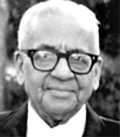
Harbans Lal Sarin
Manmohan Lal Sarin
Senior advocate
Every judge, lawyer or student of law in India and Pakistan today knows that the "Commentary on the Law of Evidence" by Justice M Monir, former Chief Justice of Pakistan, first published in 1936, has attained the status of a classic and is a must for any law library. This a superbly written commentary on an equally deftly drafted enactment, almost died an unnatural death during the Partition of the country.
Senior advocate and former chairman of the Bar Council of Joint Punjab Harbans Lal Sarin enrolled as a lawyer on June 23, 1932, in Lahore. Being the first from an agriculturists' family to opt for the legal profession, he, as most fresh entrants do, found it difficult to procure work and keep himself busy. He was lucky in having Mr Mohammed Monir, a brilliant jurist, as a friend and mentor. Monir was writing the original treatise on Evidence and he asked three of his friends, including Mr HL Sarin for help. The book proved to be so popular that it was reprinted twice in two years. The second edition (of 1940) was also sold out as it hit the shelves.
The third edition was under preparation in the late 1940s when all hell broke loose. Inexplicably, man became a beast and communal riots broke out all over shortly before the independence of the country. Mr Sarin had to leave Lahore at short notice. Before abandoning everything (including his extensive library, the pride of every lawyer) and jumping on to a truck with his family, Mr HL Sarin had the good sense to rush to a bank in Lahore and leave the greatly laboured and handwritten manuscript of the third edition of the book on Evidence in a locker. The next six months, the family (comprising his wife and three minor children) lived in a refugee camp at Dharamshala.
When things seemed to have settled down, Mr Sarin and a senior colleague of his, the late Justice Tek Chand of the Punjab High Court, got permits to return to Lahore. Monir (who was a judge of the Lahore High Court, then) arranged for permission for them to operate the bank locker and retrieve the manuscript. As soon as that was done and they had returned to Monir's palatial residence, they got the spine-chilling news that Mahatma Gandhi had been assassinated. Yes, it was that fateful day 70 years ago —January 30, 1948, and they were in Lahore. They did not know what was in store for them. Will they get back to India alive?
The events that followed that day were repeatedly narrated by Mr HL Sarin to his children, scores of times, over the next four and a half decades till he breathed his last on February 10, 1993, as an example of 'true friendship' which knows no barriers - certainly not religion or politics. Though he lost his land, home and library in Pakistan, he never talked ill of any one.
As the news of the ghastly assassination sunk in, and fearing the worst, it was decided that Mr Sarin and Mr Tek Chand would return to Amritsar immediately. Justice Monir, as a Lahore High Court Judge, had a large number of peons and other staff attached with him. As luck would have it, Justice Monir had to leave for inspection of a remote area the same day. He lined up his entire staff and told them: “Tek Chand and Harbans Lal Sarin are my ‘jigree dosts’ (bosom friends) and if anything happens to them, I would never forgive myself or any one of you.” He even threatened to shoot them if any harm came to either of them. While two persons were to accompany Monir for inspection, the others were ordered to safely escort his two friends across the border at Amritsar. They made it across safely — though throughout their never-ending journey from Lahore to Amritsar (a distance of just over 30 miles), they had their hearts in their mouths - not knowing what might happen the next moment.
That was the last time Mr Sarin saw Justice Monir, who after his retirement as Chief Justice of the Supreme Court of Pakistan died in exile in London in the 1970s.
Mr HL Sarin lived to publish the third edition of Monir's Law of Evidence from Allahabad, followed by several others. More important than that, he lived to narrate the positive story of human friendships (he rarely talked about the sordid, inhuman killings during the Partition). His positive attitude in life and his refusal to blame any particular group for the ugly happenings during the division of India, and his belief in the inherent goodness of man resulted in his (together with his wife — who was a deeply devoted mother) bringing up their five children in such a wonderful atmosphere that none of the offspring ever knew how to distinguish between two individuals on the basis of their religious beliefs. They always propagated the universality of mankind and promoted friendship and goodwill towards all. All the children had friends from all different faiths, some even went to Christian-run schools. They picked up and learnt their good qualities. No one could accuse any member of the family of hating any one because of his religious beliefs.
Incidentally, that great man, Mr Harbans Lal Sarin, was my father — a true super-human. It happens to be his 25th death anniversary this year.



























